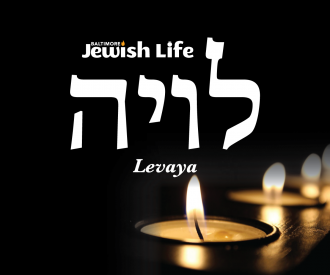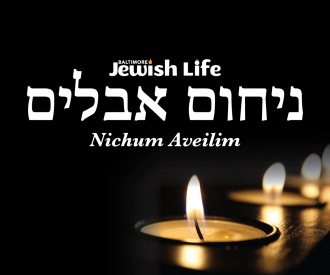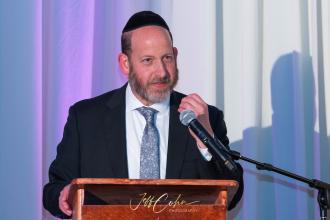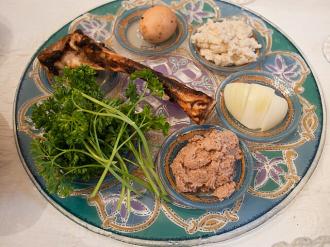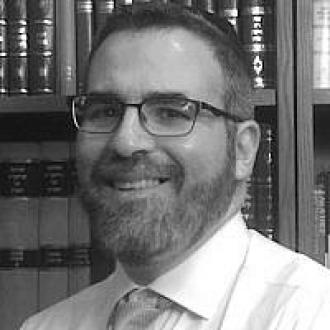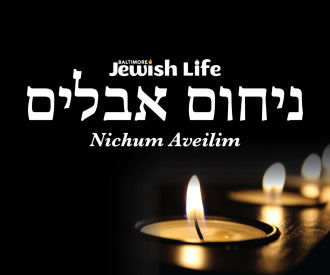We are poised to celebrate a Shabbos of נחמה— comfort. We quickly transition from three weeks of mourning to warm hope of a better future.
Already on Tisha B’Av, after chatzos, we pray Mincha and insert a special addition to the blessing of Rebuilding Jerusalem, the Nachem prayer, an appeal for G-d to comfort us. It begins with calling out to G-d to console the mourners Zion and... Jerusalem, going on to painfully describe how bereft and bitter we are. It concludes with the sentiment, For You Hashem, with fire You consumed her, ובאש — and with fire You will rebuild her, as it is said ‘I will be for her her, , the words of Hashem, a wall of fire, and I will be glorious in her midst.’
The prayer ends with the closing blessing, Blessed are You, Hashem, Who consoles Zion and rebuilds Jerusalem.
Strangely, the blessing does not contain any words of comfort, just the notion of a restoration to its former grandeur, through fire.
The sole model of despair that is utilized in this prayer describing this profound sense of loss is the depiction of an עקרה ולא ילדה — barren woman who never gave birth.
Why among the many metaphors for despondency — a widowed spouse; an orphaned child; a bereaved mother — was this one selected?
There is a general rule in the construction of formal blessings that one must add a sentiment right before the concluding blessing that is like its conclusion. Our blessings close with a description of G-d as the Consoler of Zion, yet the last thought expressed prior to its end is the fact that G-d will rebuild her with fire and be a ‘wall of fire’ around her, with no mention of ‘consolation’.
In the description of the giving of the Torah fire plays a significant role. In the command to remember this event and convey it to our children, we are to recall how ‘you approached and stood at the foot of the mountain, and the mountain was burning with fire up to the heart of heaven’.
After the revelation at Sinai, they were gripped with fear appealing to G-d ‘why should we die when this great fire consumes us?’
G-d acceded to their request, withdrawing from direct contact, and communicating through Moshe instead.
When warning the people to refrain from idolatry the verse asserts ‘for Hashem, your G-d — he is a אש אוכלה — consuming fire... (דברים ד כד)
The late great Gaon, Rav Moshe Shapiro, taught that the nature of fire is that it consumes all that comes in its proximity. This represents the Divine Presence, which is described as אש אוכלה, a consuming fire. Fire cannot tolerate any other reality. This is not referring to G-d as a destructive force but merely as the fire that illuminates all of creation. Avraham Avinu is portrayed in the Midrash as having discovered the world as a בירה דולקת, a palace aflame. He uncovered the force that defines existence, G-d Himself. For those who choose to see the brilliance of the world as lit and inspired by that ‘fire’, then it need not be physically consumed. Moshe too, observed how the bush was burning in the fire but the bush was not consumed.
Those, however, who refuse to forfeit their perception of a physical realm and delude themselves into thinking it is controlled by man alone, will be forced to accept the fate of a fire that consumes and de-constructs a world inhabited by those who negate His absolute and definitive presence in all of creation.
Quoting the primary disciple of the Vilna Gaon, Rav Chaim of Volozhin, he teaches further that fire has two properties. Fire can purify elements from their impurities and at the same time bond and meld material into one.
That is the essence of the fire of חורבן — the Destruction, which compelled the physical Temple, that was neglected and forsaken as a result of our many sins, to be devoured by His flame in an powerful expression of this vital lesson, that one who denies G-d’s presence will inevitably be forged into that reality regardless.
One, however, who pledges allegiance to the super-reality of G-d’s force in the world will be illuminated by the energy of that intense flame rather than physically absorbed, while those who refuse to see G-d in the flame will be destined to be destroyed and reconstituted.
A תלמיד חכם — Torah Scholar, is termed אש — Fire. When his presence is subsumed with the Divine Presence, the ‘flames’ merge into one. It is no longer a consuming fire, since for those whose entire being illuminates G-d’s word become an entity of eternity, never to be extinguished. (אפיקי מים - בית המקדש ענין מב')
The greatest consolation we can receive is reveling in this reality, that even when we are ‘consumed’ by tragedy it is merely the process by which we become one with G-d and His will.
Our imperfection warrants our yet being forged in the furnace of challenge. But even as we get ‘burned’ we are ever conscious that we are being lovingly bonded to Him through that fire.
There is one woman in Jewish history who we are told lived for eternity, ascending in body to Gan Eden accompanied by 600,000 angels. (תרגום יונתן בן עוזיאל במדבר כו מו)
Her name was שרח — Serach, the daughter of אשר — Asher.
Her very name is an acronym for the sentiment expressed in Shir Hashirim (שה"ש ח יג) regarding a woman who sits in the gardens, and the חברים — friends hearken to her voice, a reference to these myriads of angels who are inspired by her every word — ששים רבוא חברים
(הרמ"ע מפאנו מאמר מאה קשיטה סי' צח)
Serach played a pivotal role throughout our history. She completed the number of seventy core souls that descended to Egypt. She was a wise and talented woman who was trusted with informing Yaakov that Yosef was alive, in a manner that would not shock him and bring about his premature demise. This was critical in assuring Yaakov would descend to Egypt in the fulfillment of the divine plan. Serach was entrusted with the secret ‘password’ of redemption that Moshe shared, thus verifying Moshe as the true leader who was destined to take them out of slavery. When the time for redemption came Moshe desperately sought the coffin o Yosef, otherwise they couldn’t leave as they had sworn, they would take his remains with them. It was Serach who directed Moshe to its location, thus allowing the exodus to begin. In the days of King David she, with great tact, quelled a war and rebellion incited by the harboring of Sheva, a detractor of King David, in the town of Avel. She presented a strategy to Yoav that brought a peaceful end to the situation, bringing Sheva to do justice without sacrificing the welfare of the town.
Serach introduces herself to Yoav in this last episode as שלומי אמוני ישראל — wholly devoted to the faithful of Israel.
Serach is a guarantor to the eternity of our nation. She is the ‘fire’ that illuminates and bonds us as one with Hashem.
Nowhere is there any indication this ‘eternal’ woman had children. Despite the lack of progeny which gives a mother a sense of being the child’s link to a past, and the child becoming the mother’s connection to the future, Serach remained ‘eternal’. Her insight, character, wisdom, and complete and total devotion to the perpetuation of the Divine will within every fiber of her being, became a fire that joined into the flame of Torah for all of eternity.
Most of us are ‘candles’ who must ignite a new light before our fuel is consumed, to link us to eternity. But there are those who transform their very essence into a fire of unending Torah and spiritual energy.
The holy Ben Ish Chai reveals that there is a Holy Name of G-d that is embedded within the Torah’s description of Serach.
ושם — and the name, בת אשר — of Asher’s daughter: שרח — Serach. (במדבר כו מו)
In order the Name reads ובא"ש.
Might the barren woman of Nachem, allude to Serach? To her the consolation is ובאש אתה עתיד לבנותה — and with fire, You will rebuild her. Perhaps alluding to this quality of becoming a ‘fire’ that will never extinguish, since it is united so totally to the flame of His will.
Years ago, in Ami Magazine, writer Judith Leventhal retells a fascinating true tale.
Two soon to be mechutanim each set out to invite their respective deceased ancestors to the upcoming wedding of their children. The Zohar tells us that our antecedents join under the canopy of the bride and groom on their momentous day. They discovered that not only were they each going to the exact same cemetery, but the sections, Bobov and Munkatch, where their relatives were buried, were directly adjacent to one another. After each one invited their parents' and grandparents' souls to the wedding, one of them observed that his future mechutan was now joining him and searching for a plot among the graves. His friend told him that he was looking for the plot of his beloved aunt, a survivor, who although never merited children of her own, was like a Bubby to him and his siblings. Upon hearing this he exclaimed to his friend “What a remarkable coincidence, for I too am hunting to find my beloved aunt, who also survived the Holocaust, never had children but was also like a grandmother to our family!” Together they scoured the rows of graves within that section and were astonished to discover that they were both buried next to each other! Less than twenty-four hours later the two new friends and their spouses stood alongside their children under the canopy together with their beloved ancestors.
There are many Serachs among us that illuminate our world with the inextinguishable flame that touches eternity. May they find consolation and inspire us forever.
באהבה,
צבי יהודה טייכמאן

